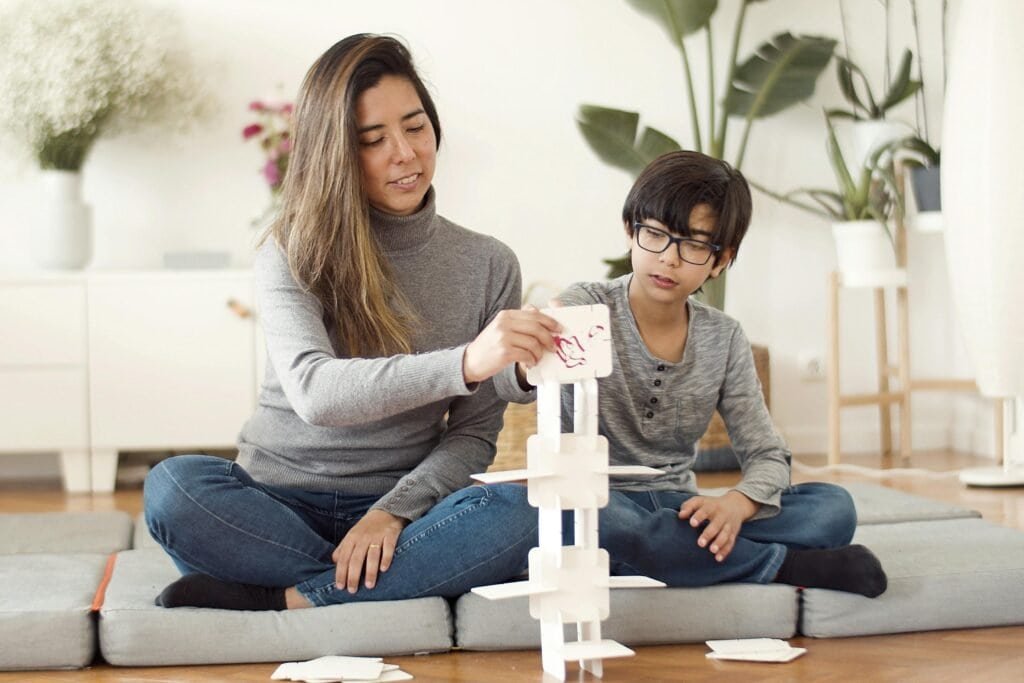
Parenting today presents unique challenges. In a world where technology dominates and schedules are packed with endless commitments, many parents find it difficult to nurture the deep connections with their children that are so essential for emotional health and development. Yet, amidst these challenges, there is a silver lining. It’s still very much possible to foster a strong, healthy bond with your child, even in the face of a busy, tech-driven world.
In this blog, we’ll explore practical ways to strengthen the parent-child relationship and cultivate a supportive, emotionally rich environment for growth—despite the distractions and demands that come with modern parenting.
Finding Balance: Setting Healthy Boundaries with Technology
There’s no denying that technology is an integral part of daily life. From smartphones to tablets and social media to Artificial Intelligence (AI), our children are growing up in a world deeply connected to the digital realm. While technology can provide learning opportunities and entertainment, it also presents significant challenges when it comes to bonding. Excessive screen time can limit face-to-face interaction, leading to feelings of emotional distance.
While parents are busy, often glued to their phones, children pick up on this behavior. We may not have been born in an era where smartphones existed, but our children are born into this era, where digital devices are a constant presence. Now, imagine what our children are observing. They see us reaching for our phones when we’re bored, stressed, or looking to disconnect, and they internalize these habits. It’s essential to be mindful of the examples we set, as children often model their behavior after what they see in us.
I get it. We’re all busy, and sometimes it’s just easier to put a screen in our kid’s face when they’re restless, giving us a moment of quiet time. Technology offers a quick “fix”—whether it’s keeping your child entertained or giving you some space to recharge. But while it may be convenient in the moment, this habit in the long-term can slowly create emotional distance and affect the quality of your connection with your child. Instead of banning technology altogether, which is often unrealistic, it’s essential to find a balance.
One effective strategy is to implement screen-free zones or tech-free times within your home. For example, consider making the dining table a screen-free zone, where you can enjoy meals together without distractions. Similarly, setting aside tech-free time before bed can help your child wind down without the overstimulation that screens often bring. These small but intentional moments provide valuable opportunities to engage with your child on a deeper level, share conversations, and bond without the constant pull of devices. Another great way to find balance is by being mindful of family activities. Instead of defaulting to screen time for entertainment, consider setting up activities that encourage connection, such as playing a board game, doing a craft, or spending time outdoors together. It’s about creating space for more meaningful and personal connections.

Managing Busy Schedules: Quality Time
In the hustle and bustle of modern life, many parents struggle to carve out time to bond with their children. Between work, school, extracurricular activities, and household responsibilities, it can feel like there’s no time left to simply connect.
Here are some practical ways to manage your time and create quality moments with your child:
- Use Routine Activities as Bonding Time: Take advantage of daily routines like car rides, meal prep, or bedtime stories as opportunities for conversation and connection. These moments don’t require extra time but can make a world of difference in strengthening your bond. Whether you’re driving to soccer practice or cooking dinner together, these activities provide the perfect opportunity for meaningful, uninterrupted interactions.
- Set Time Limits for Work and Household Tasks: It’s easy to get caught up in the endless to-do list, but setting time limits for work and household chores can help create space for your child. Prioritize the most important tasks and create time for relaxation and play. By managing your time more effectively, you’ll free up small windows of opportunity for quality time with your child.
- Create “Intentional Time” in Your Calendar: Just as you schedule meetings and appointments, block out time for your child in your calendar. Treat it as an appointment with your child that cannot be moved. Whether it’s an afternoon outing or a quiet evening together, scheduling intentional time ensures that you’re dedicating time to nurture your relationship.
The Importance of Presence: Re-evaluating What Matters Most
As a parent, it’s important to prioritize intentional time over fleeting interactions. As parents know, in the blink of an eye, our children grow up. Time slips away faster than we realize, and before we know it, they’re a lot older. This is why it’s crucial to re-evaluate what truly matters. One-on-one time with your child, where you’re fully engaged and available, has the power to strengthen your bond in ways that rushed interactions or distracted moments simply cannot. When you’re truly present in the moment, you create a space for deeper connection, allowing your child to feel seen, heard, and valued, which strengthens the foundation of trust and emotional security between you both.
The next time you have a moment with your child, try to let go of distractions. Put down your phone, turn off the TV, and focus entirely on them. You’ll find that these small moments of presence can make a significant impact on your relationship and your child’s emotional well-being.

Embrace the Imperfection of Parenting
In a world that often celebrates perfection, it’s important to remember that parenting doesn’t have to be flawless. Your child doesn’t need a perfect parent—they need a real one. Parenting is a journey, and it’s okay to make mistakes and have tough days. Parenthood can be tough, but you don’t have to do it in isolation, and you certainly don’t need to burn yourself out trying to handle everything on your own. Reach out to trusted friends and family for support. Don’t hesitate to find a therapist who can help you navigate the challenges of parenting and maintain your mental well-being. Find local resources like parenting groups, community centers or neighborhood meet-ups.
Parenting is demanding, but by leaning on your support systems, clarifying what truly matters, carving out time for meaningful moments with your child – you can find the strength, balance, and connection that help you thrive as a family.